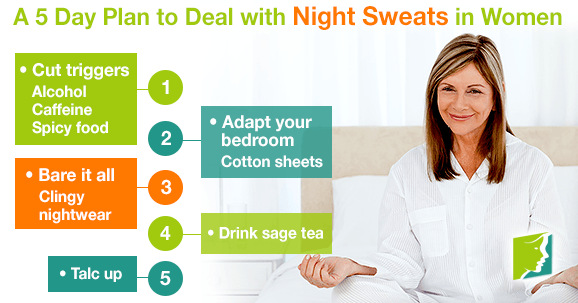Night sweats can be a real obstacle between you and a good night's sleep. Women often experience regular nocturnal sweating episodes as they approach menopause, and this is primarily due to hormonal changes that take place in the body during these years. Fluctuations in hormones trigger internal temperature increases, to which the body responds by producing sweat to cool down. Lifestyle factors may intensify these hormonal effects and trigger sweating episodes. By adjusting your habits and environment over just five days, you can banish night sweats for good.
Day 1: Cut Triggers
Alcohol, caffeine, and spicy foods are all dietary stimulants that cause an increase in internal body temperature. This means that, when consumed within two hours of going to bed, their consumption is likely to trigger sweating episodes during the night. By all means, unwind with a glass of wine after work or enjoy a curry for lunch, but to prevent night sweating, it's important to cut these triggers from your evening diet.
Day 2: Adapt Your Bedroom
This may sound obvious, but the temperature of your sleeping environment may trigger the onset of sweating episodes. Scrutinize your bedroom with a critical eye. Do you sleep under heavy, unnecessary blankets? Turn off the central heating, open a window, and replace the blankets with layered sheets in breathable fabrics - such as cotton - to sleep beneath, as these allow air to access your body and can easily be kicked off if you get hot.
Day 3: Bare it All
Take off your clothes! Sleeping in clingy nightwear made from synthetic materials, like lace or silk, invites sticky clamminess by restricting airflow to the skin. Sleeping naked allows air to access your body, to keep you cool and enable any sweat that is produced to evaporate from your skin. If you're feeling self-conscious, loose cotton nightwear is a breathable alternative to sleeping in the nude.
Day 4: Drink Sage Tea
As unlikely as it sounds, sage tea has been found to have considerable sweat-relieving properties. Dabbing a cool sage poultice over sweat-prone areas before going to bed could significantly reduce the likelihood of sweating during the night. However, if this idea doesn't take your fancy, drinking a cup of iced sage tea or seasoning your evening meal with the herb may be an equally effective - and more appealing - alternative.
Day 5: Talc up
Talcum powder isn't just for babies and the aged; try applying it to the armpits, chest, feet, and other sweat-prone areas to prevent sweating. Talc is an astringent, which means it causes skin tissues to constrict and become smooth and dry. It's also fragrant to mask the odor of any sweating that happens to occur and enable you to wake up feeling fresh, rather than sticky and unhygienic.
These tricks are simple, natural, easy, and likely to yield fast results. Following this plan may involve cutting back on things you enjoy, but focusing on the goal - getting rid of those sweats - will help you to see these sacrifices for what they are: a small price to pay for eight hours of uninterrupted sleep. In less than a week, you can rediscover what it means to enjoy a restful sleep, sweat-free, and late-night coffees, thick pajamas, and heavy blankets will seem a distant memory. You can also follow some bedtime rules to combat night sweats.
Sources
- Dall, L. & Stanford, J.F. (1990). Fever, Chills, and Night Sweats. In: Clinical Methods: The History, Physical, and Laboratory Examinations. 3rd ed. Retrieved from http://www.ncbi.nlm.nih.gov/books/NBK324/
- National Health Service UK. (2012). Night sweats. Retrieved March 14, 2014, from http://www.nhs.uk/conditions/night-sweats/Pages/Introduction.aspx
- Shenefelt, P.D. (2011). Herbal Treatment for Dermatologic Disorders. In: Herbal Medicine: Biomolecular and Clinical Aspects. 2nd ed. Retrieved from http://www.ncbi.nlm.nih.gov/books/NBK92761/




